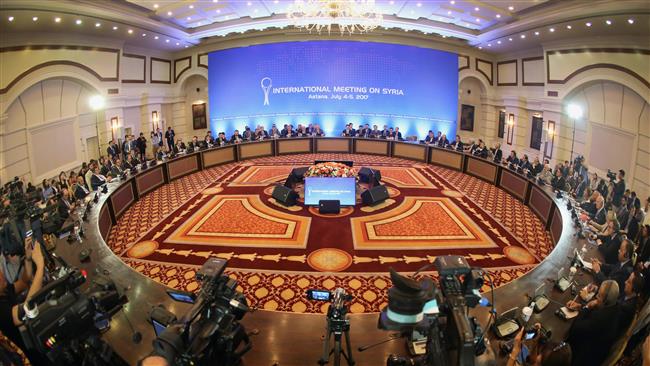ASTANA – Participants of the fifth round of the Syrian talks wrapped up an inconclusive second day at the negotiating table in Astana July 5, after attempting to finalise the boundaries of the de-escalation zones in Syria and break the deadlock over who will police them.
The latest round of peace talks on Syria took place in the Kazakh capital July 4-5 to seek the end for violence in the Syrian conflict, where negotiators from Russia, Turkey, Iran, the Syrian Arab Republic, the Syrian armed opposition, the United Nations as well as the observing states of the U.S. and Jordan held a string of closed-door meetings to discuss seven documents on de-escalation zones in the war-torn Arab country.
No documents were signed during the talks but the sides adopted a provision on a joint working group, which was tasked to hammer out details of a plan for de-escalation zones.
“We did not succeed in establishing the de-escalation zones directly,” Russian President Vladimir Putin’s Special Representative on a Syrian settlement Alexander Lavrentiev acknowledged, adding, however, that safe areas already de-facto existed on the ground.
Commenting on the modest outcome of the talks, Kazakh Foreign Minister Kairat Abdrakhmanov admitted there was “room for further improvement in certain areas.” But he also argued that each round of talks in Kazakhstan “yields concrete results, which have positive impact on the lives of hundreds of thousands of Syrians.”
As a host to the international negotiations, Abdrakhmanov praised “the tireless work of the Astana Process participants”, which has paved the way for “a gradual, but significant progress”.
He also urged the parties to the Syrian conflict to refrain from activities that would undermine existing successes toward peace, noting “there is no military solution, … and, therefore, dialogue is the only path to peace.”
“On behalf of the Secretary-General, Antonio Guterres and of everyone present here, I want to reiterate how much we appreciate the generous and effective hospitality of the Kazakh government and of His Excellency, the President – and by the way I take advantage since tomorrow is his birthday and the Astana Day to make our own best wishes,” UN Secretary General’s Special Envoy for Syria Staffan de Mistura said at the end of the talks on July 5.
“We from the UN do appreciate the persistence, the determination the constant hard work of the Astana Guarantors and all the countries who are being involved in this effort of de-escalation of violence and the strengthening of the ceasefire in Syria. We have tried already three times you know with the ceasefire in Syria in the last period of the last three years, so we really want to give a chance to what is being done here and we believe that efforts have been producing progress,” he said.
“We have some experience about this,” de Mistura said. “In Geneva, we have seen more than once we are familiar with the fact that the complexity of a conflict like this require a lot of patience, strategic patience, determination and insisting in wanting to constantly make even small steps in the right direction. Astana is particularly meant for producing a ceasefire, what they call a de-escalation, and that is why we believe that Astana does deserve patience and support, and there is more energy and time required – and we are with them in trying to make sure this will happen.”
The next round of talks on Syria will be held the last week of August in Astana, according to the joint communique of guarantor countries on the results of the fifth round of talks.
The talks’ participants noted the importance of the Astana meetings in facilitating the Geneva Process. The next Geneva process talks were to take place July 10.
The guarantor countries also decided to hold the next meeting of the joint working group Aug. 1-2 in Iran and communicated the importance of quick, safe and unhindered front access to zones affected by the conflict.
Over the two days of talks, the sides focused on the identification of four de-escalation zones, the memorandum on the establishment of which became the main result of May 3-4 round of the Astana process. This time, nine representatives of the armed Syrian opposition arrived in Astana. However, Mohammad Alloush, who headed the opposition delegation at previous talks in Astana, did not attend the meeting. Bashar al-Jaafari was chief negotiator for the Syrian government.
Lavrentiev, Turkish Deputy Foreign Minister Sedat Onal and Iranian Deputy Foreign Minister for Arab and African Affairs Hossein Jaberi Ansari were present at the Astana Process as guarantors of the Syrian truce. Delegations from the U.S. and Jordan, as well as UN Special Representative for Syria Staffan de Mistura attended the talks.
Previous four rounds of meetings took place in Astana on Jan. 23-24, Feb. 15-16, March 14-15 and May 3-4. During the fourth round of the talks, Tehran, Moscow and Ankara signed an agreement to establish four de-escalation zones in Syria.
According to Lavrentiev, the sixth round may be held earlier than scheduled if conditions for making decisions on the establishment of the de-escalation zones arise.



